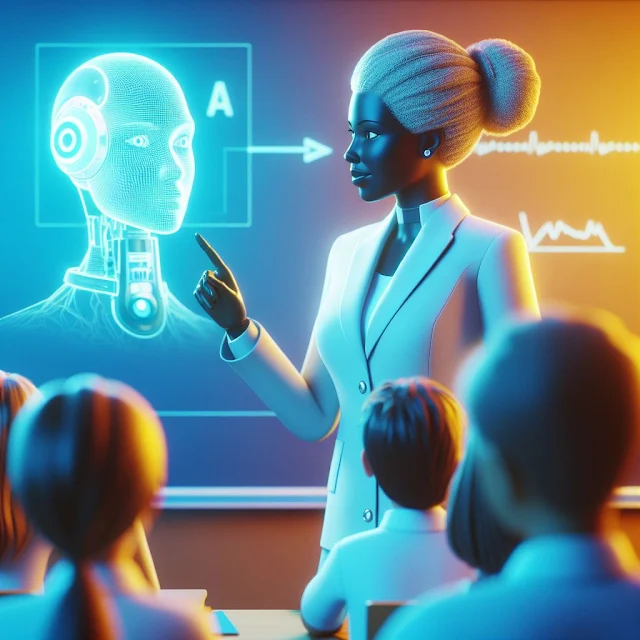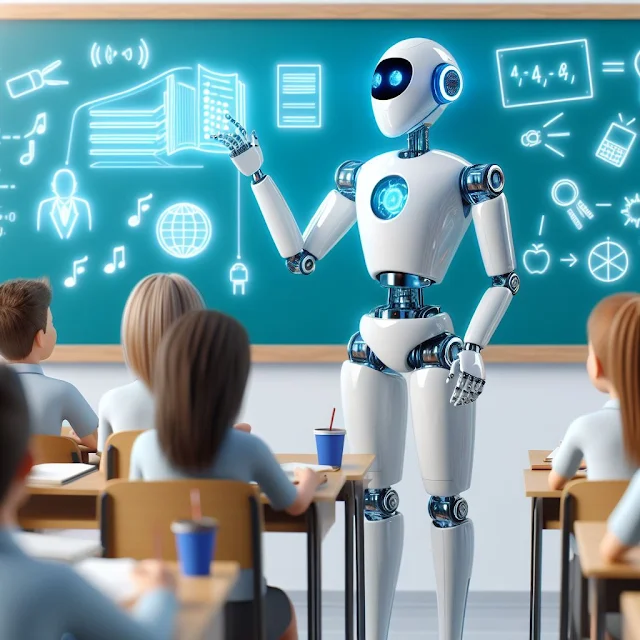Unlocking the Future: The Imperative Role of AI in Education
Introduction:
In the rapidly evolving landscape of education, the integration of Artificial Intelligence (AI) has emerged as a transformative force, revolutionizing traditional teaching methods and reshaping the learning experience. This article delves into the crucial reasons why AI is indispensable in education, exploring its potential to enhance personalized learning, streamline administrative tasks, and foster a more inclusive and effective educational environment.
1. **Personalized Learning:**
Education is not one-size-fits-all, and traditional classrooms often struggle to cater to the diverse learning styles and paces of individual students. This is where AI steps in, with its capacity to facilitate personalized learning experiences. Adaptive learning platforms, powered by AI algorithms, analyze students' strengths and weaknesses. By tailoring lessons to their specific needs, AI ensures that each student receives a customized educational journey, promoting a deeper understanding of subjects and fostering a genuine love for learning.
Personalized learning isn't just about adjusting the difficulty level of questions; it also involves adapting the teaching style, materials, and pace to match the student's unique requirements. AI achieves this by continuously assessing a student's progress and adjusting the learning path accordingly. The result is a more engaged and motivated student body, as the educational experience becomes more relevant and meaningful to individual learners.
2. **Efficient Administrative Processes:**
Beyond the classroom, the education system involves a plethora of administrative tasks that can be time-consuming for educators. AI can significantly streamline these processes, allowing teachers and administrators to allocate more time to teaching and mentoring. Automation of routine activities, such as grading assignments, attendance tracking, and scheduling, frees up valuable resources. This efficiency not only reduces the burden on educators but also contributes to a more organized and responsive educational system.
By automating administrative tasks, AI ensures that educators can focus on what they do best—teaching. It simplifies record-keeping, grading, and other administrative functions, allowing educators to invest more time in developing innovative teaching methods and connecting with students on a personal level. The result is a more enriched educational experience for both educators and students.
3. **Intelligent Tutoring Systems:**
AI-powered intelligent tutoring systems represent a paradigm shift in providing students with personalized assistance outside the traditional classroom setting. These systems leverage machine learning algorithms to analyze a student's performance and tailor their guidance accordingly. Real-time feedback, identification of areas of improvement, and the provision of additional resources all contribute to strengthening the student's understanding of the subject matter.
The role of these intelligent tutoring systems is not to replace traditional teaching but to complement it. Students can access support whenever needed, making their learning experience more dynamic and responsive to individual learning curves. This approach fosters a sense of independence and self-directed learning, skills that are invaluable in the rapidly changing landscape of the 21st century.
4. **Enhancing Teacher Effectiveness:**
AI is not designed to replace teachers but rather to augment their capabilities. By handling time-consuming tasks and providing valuable insights into students' progress, AI empowers educators to focus on building meaningful connections with their students. This shift allows teachers to concentrate on designing engaging lessons, fostering critical thinking, and nurturing essential interpersonal skills.
When educators are freed from the burden of administrative tasks, they can invest more time in professional development and collaboration. AI can assist in identifying areas where teachers may benefit from additional training or support, further enhancing their effectiveness in the classroom. By creating a symbiotic relationship between AI and educators, we pave the way for a more enriched and dynamic educational experience.
5. **Data-Driven Decision Making:**
In the digital age, data has become a powerful tool for informed decision-making, and education is no exception. AI excels at collecting and analyzing vast amounts of data. In the educational context, this ability supports data-driven decision-making processes. Schools and institutions can utilize AI to assess the effectiveness of various teaching methods, identify areas of improvement, and implement evidence-based strategies to enhance overall educational outcomes.
The insights derived from AI-driven analytics enable educational institutions to make informed decisions about curriculum development, resource allocation, and policy implementation. By leveraging data, educators can identify patterns and trends, allowing for targeted interventions to address specific challenges. This data-driven approach contributes to continuous improvement in the quality of education provided.
6. **Inclusive Education:**
The pursuit of inclusive education is a fundamental goal for educational systems worldwide. AI has the potential to make significant strides in this direction by addressing individual learning needs and accommodating diverse abilities. For students with special needs, AI can provide tailored interventions, adapting content and assessments to suit their requirements.
Inclusivity in education is not just about accommodating students with special needs; it's about creating an environment where every student, regardless of their learning style or challenges, can thrive. AI can facilitate this by providing personalized support, fostering a sense of belonging, and ensuring that each student's unique abilities are recognized and nurtured.
7.**Lifelong Learning:**
As the demands of the workforce evolve, the concept of lifelong learning becomes increasingly vital. AI can support this paradigm by offering personalized, on-demand learning experiences. Continuous assessment and adaptive learning platforms empower individuals to acquire new skills and knowledge throughout their lives, ensuring they remain competitive in an ever-changing job market.
Lifelong learning is not confined to formal education but extends beyond, encompassing professional development and upskilling. AI-driven learning platforms can recommend relevant courses, identify skill gaps, and provide opportunities for individuals to stay updated in their respective fields. This proactive approach to lifelong learning is crucial for adapting to the dynamic nature of industries and maintaining relevance in a rapidly evolving job market.
Conclusion:
In conclusion, the integration of AI in education represents a pivotal step towards a more effective, personalized, and inclusive learning environment. By harnessing the power of AI, educational institutions can address the diverse needs of students, empower teachers, and prepare individuals for the challenges of the future. As we embrace the potential of AI in education, we unlock new possibilities to shape a generation that is not only academically proficient but also equipped with the critical essential competencies required for thriving in the 21st century.
This transformation is not without its challenges, and careful consideration must be given to ethical concerns, data privacy, and equitable access to AI-driven educational tools. However, by navigating these challenges with a commitment to fostering innovation responsibly, the educational landscape stands to benefit significantly from the continued integration of AI technologies. As we journey into the future, the collaboration between human educators and artificial intelligence holds the promise of creating a truly dynamic and adaptive educational ecosystem that prepares students for the opportunities and challenges that lie ahead.







.jpg)






0 Comments